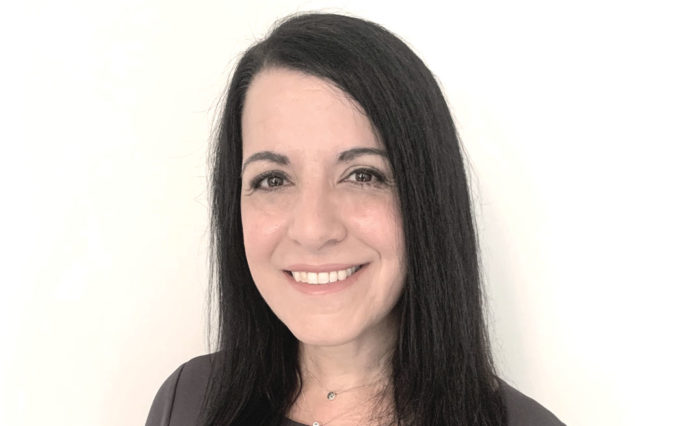
by Bobby Anderson, RN – staff writer/photographer
Maria Grandinetti, Ph.D., RN, BSBA, CNE is closing in on 28 years in nursing.
Her career has coincided with an ongoing nursing shortage and now the worst pandemic in several generations.
Now, as an associate professor at Wilkes University Passan School of Nursing in Pennsylvania, there’s a waitlist of students hoping to get into the school’s accelerated nursing program.

For you. For health. For life.
Find your purpose at INTEGRIS…and your calling
APPLY TODAY AT
IntegrisOK.jobs
INTEGRIS considers all qualified applicants regardless of protected status as defined by
applicable law, including protected veteran or disability status.
AA/EOE
And Grandinetti sees how the two forces are coming together to hopefully form a positive for the future of nursing.
“My passion is definitely in the classroom whether it be face to face in the classroom or in the clinical setting,” Grandinetti said. “I also love teaching online in the graduate program, too. I feel like I relate to the students to those students. They come with diverse backgrounds and life experiences.”
“They are putting their life on hold and making great sacrifices and they really, truly will do what is needed to be successful.”
Grandinetti is a second-career nurse herself, originally earning a degree in business finance.
“I love it,” she said. “I felt so comfortable, even from day one, and I continued educationally with nursing all the way up to my Ph.D in nursing education.“
As a tenured professor, she has taught at Wilkes for the past 12 years. But nothing could have prepared her or her students for what they encountered this year.
Covid 19 ended in-person classes as well as clinicals.
As traditional nursing education collided head-on with a global pandemic, Grandinetti thinks an opportunity was forged.
“The virus is here and with this challenge I see we have opportunities as well,” Grandinetti said. “We need to overcome these challenges and continue. We can’t stay stagnant. We have to keep moving – faculty, staff and students.”
What Covid 19 did was force nursing education to evolve with the times and circumstances. An institution often accused of being dated in its delivery method has had to evolve to keep students from being left behind.
If necessity is the mother of invention then Grandinetti says educators have had to evolve these last few months like never before.
In-person classes have been replaced by Zoom meetings. Clinicals have moved away from patient care contact to simulations.
Continent delivery systems have been utilized like never before with professors putting an added emphasis on availability to students feeling their educational world crashing down around them.
Grandinetti has long helped her students finish their licensure exam prep with UWorld.
More than 700,000 nursing students have trusted UWorld for their exam-prep needs since launching in 2015, and now colleges and universities are utilizing the technology for a next-generation standard in nursing education.
UWorld boasts a 95% NCLEX pass rate by students who actively use the platform.
“You have to be really proactive with a lot of planning and a lot of collaboration and using resources,” Grandinetti said.
She said UWorld has been helpful in helping with licensure.
“We’ve had great success using UWorld,” she said. “UWorld has been helpful in helping with licensure, promoting critical thinking and adaptive testing.”
Grandinetti and her fellow instructors began noticing something as they reviewed the course feedback from the previous semester.
Many of the students felt the online format of instruction and additional resources offered helped promote a greater clarity and understanding of concepts.
“Which is really nice to hear,” she said. “We really need to use technology tools to help with these asynchronous-synchronous learning environments.”
Seeing her accelerated program with a waiting list also reaffirms that many Americans are taking pause when determining if their current career is sustainable for the future.
With the U.S. unemployment rate currently above 11 percent, Grandinetti believes Americans are seeing that healthcare holds the type of job security many are seeking.
“We are seeing more and more people gravitating towards the nursing profession,” Grandinetti said. “We’ve talked about this. Health care seems to be something people are more aware of. It’s a position that’s respected and a position that most likely – even during this difficult time – will be there with a job and salary that is something an individual family can live on.”
“I think people are gravitating toward (job) security.”
For the first time this fall, Grandinetti said her college has had to cap enrollment in the graduate program.
Instructors are supplying students – most of whom are stuck at home – with more resources to dive deeper into topics and gain a greater understanding of content like never before.
And all it took was a pandemic for it to happen.
“There’s a lot of positives to it,” Grandinetti said. “It allows our programs to be more fruitful with enrollment. It has shown we can use technology such as UWorld as our primary to assist students during this challenge.”
“It’s allowing (students) to continue to develop and to continue regardless of this pandemic.”
“I think in a way this opportunity … is allowing us to change our direction in how we deliver content.”












